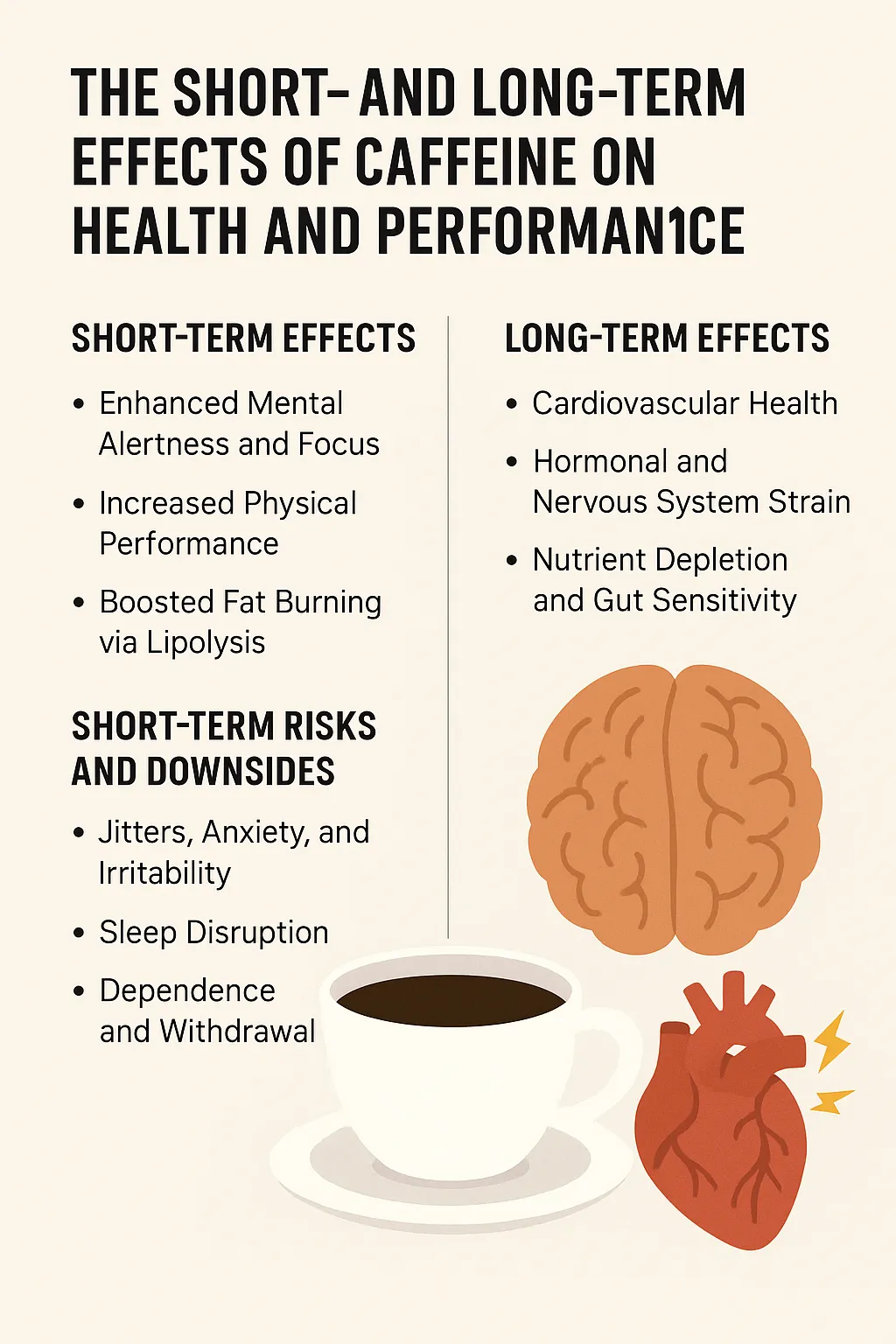
Subscribe to the monthly blog
Join our community and get regular emails on Gut Health, Stress Management, Nutritional Strategies and Health Habits.
Library

The Short and Long-Term Effects of Caffeine on Health and Performance
Caffeine is the most widely consumed psychoactive substance in the world. Found in coffee, tea, energy drinks, supplements, and even chocolate, it’s embedded in many people's daily routines — especially those seeking an edge in energy, focus, and physical performance.
But what are the real effects of caffeine on the human body? Like any tool, caffeine’s impact depends on how it's used — dose, timing, and frequency all matter. In this article, we’ll unpack the short-term and long-term effects of caffeine on health and performance, and look at how it influences fat burning, stress hormones, and recovery.
Short-Term Benefits of Caffeine
When dosed appropriately and timed well, caffeine offers clear performance and cognitive benefits:
1. Enhanced Mental Alertness and Focus
Caffeine acts primarily by blocking adenosine receptors in the brain — adenosine being a neurotransmitter associated with fatigue and drowsiness. By doing so, it increases neuronal activity and boosts the release of dopamine and norepinephrine, sharpening mental clarity and reaction time.
2. Increased Physical Performance
Caffeine has been shown to increase endurance, power output, and perceived effort during exercise. It enhances calcium release in muscle cells, which improves contractility, and it reduces pain perception and the feeling of effort — critical for pushing harder during high-performance scenarios.
3. Boosted Fat Burning via Lipolysis
A lesser-known but significant benefit of caffeine is its ability to enhance lipolysis — the breakdown of stored fat into free fatty acids for fuel. This happens through caffeine's stimulation of catecholamines (adrenaline and noradrenaline), which activate hormone-sensitive lipase (HSL). The result: more fat mobilized into the bloodstream for oxidation, particularly beneficial during moderate-intensity endurance work or when training in a fasted state.
The Downside of Caffeine (Short-Term)
While caffeine can help unlock peak performance, it’s not without trade-offs — especially in excessive doses or when used poorly.
1. Jitters, Anxiety, and Irritability
When caffeine triggers a large surge in catecholamines, it can overstimulate the nervous system. The same adrenaline that helps sharpen performance can also lead to shakiness, restlessness, and anxiety, especially in individuals who are caffeine-sensitive or under-recovered.
2. Sleep Disruption
Caffeine has a half-life of 5–8 hours, meaning even a midday coffee can interfere with deep sleep and REM cycles. For high performers, this can be detrimental, compromising recovery, hormone regulation, and cognitive performance the next day.
3. Dependence and Withdrawal
Regular caffeine use can create a tolerance, requiring higher doses to achieve the same effect. Abrupt withdrawal often leads to fatigue, headaches, and poor concentration — a sign the body has adapted to a daily caffeine hit.
Long-Term Effects of Caffeine
The long-term impact of caffeine on health is dose-dependent and highly individual. Moderation is key.
1. Cardiovascular Health
In moderate doses (200–400 mg/day), caffeine does not appear to increase the risk of heart disease in healthy individuals. However, in those with hypertension or anxiety disorders, it may contribute to elevated blood pressure and stress load if not managed properly.
2. Hormonal and Nervous System Strain
Chronic overstimulation of the nervous system — especially from high-caffeine energy drinks or pre-workouts — can lead to adrenal dysregulation, sleep disturbances, and elevated baseline stress hormone levels over time.
3. Nutrient Depletion and Gut Sensitivity
Caffeine increases urinary excretion of key minerals like magnesium, calcium, and potassium. It can also irritate the gut lining in sensitive individuals, particularly when consumed on an empty stomach.
Optimizing Caffeine for Performance and Health
If used strategically, caffeine can support both fat loss and performance — without undermining sleep, recovery, or long-term health. Here are a few evidence-backed tips:
Keep it under 400 mg/day (about 2–3 strong coffees)
Avoid caffeine after 2 p.m. to protect sleep quality
Use caffeine pre-training or competition, especially for endurance or skill-demanding sessions
Cycle off caffeine periodically to maintain sensitivity and reduce dependency
Hydrate and replenish minerals to offset any diuretic effects
Takeaway: Caffeine is a Tool — Use it Wisely
Caffeine, when used deliberately, can be a powerful aid in sharpening focus, enhancing endurance, and mobilizing fat for fuel. But it’s not without risks. Overuse can backfire — leading to overstimulation, poor sleep, nutrient loss, and reduced resilience.
For athletes and high performers, the goal should be to strategically dose caffeine to support energy and training output, while protecting nervous system balance and recovery. Know your body, time it right, and you’ll reap the rewards without the crash.

